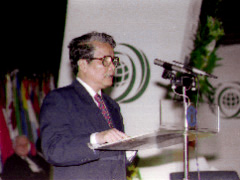


VIET NAM | ||
His Excellency Tran Duc Luong, Deputy Prime Minister of the Socialist Republic of Viet Nam | ||

At the outset, on behalf of the Government of the Socialist Republic of Viet Nam, I would like to express our deep appreciation, to FAO and to the Government of Italy, for helping to convene this World Food Summit. Our presence at this august forum clearly testifies to the strong resolve of the entire world to combat hunger and undernutrition, and it also reflects the desire for cooperation by each and every State to renew the international commitments towards the goal of "Food for All". I am confident that under the farsighted and wise guidance of the Chairman, Mr. Prodi, our Summit meeting will be crowned with great success and adopt decisions and recommendations of global significance. We are living in a world of miraculous transformations in social and economic fields. However, it is painful to see that more than 800 million people are effected by hunger, including 200 million children under five years of age being undernourished. Poverty is a main obstacle to economic growth, a factor that directly undermines political stability and security, and at the same time constitutes a major hindrance to the preservation of nature and protection of the ecological system. As the world is preparing to enter the twenty-first century, food security is an issue that should deserve the attention of the entire world, especially the developing countries. The Party and Government of our country have regarded food security as an important element that helps to sustain social and economic development. Viet Nam has, by her own endeavours, travelled a long journey from a food importing country, to become the world's third largest rice exporter. This progress is attributed to the considerable scientific and technological advances in agriculture and the intensive investment by the Government in rural infrastructure development on the one hand, and to the Government's policy of renewal of rural development on the other, especially policies on land- lease taxation, allocation to farmers of long-term land tenureship, and recognition of the farm household as a basic economic unit. Those measures have accordingly provided a motivation for, and released productive forces of, more than ten million farm households in Viet Nam. Success in food production stands as a precondition for Viet Nam to achieve national food security. It is therefore widely believed that the increase in food output serves as a fundamental and decisive factor for a poor and low- income country to ensure national food security. We fully realize, nevertheless, that a food exporting country does not necessarily have her food security ensured. As of now, between 10-15 percent of the Vietnamese population, are still threatened by food shortage and more than 40 percent of children under five remain undernourished because of inadequate access to food, as they need it. The exportation of some amount of our agricultural produce is just a solution aimed at generating foreign exchange to meet the demand for materials and supplies needed for agricultural production. In the future, Viet Nam still has to confront the following constraints to ensure food security. First, the demand for food is increasing as result of the high population growth rate, the growing needs generated by the cause of industrialization and modernization and the rising demand for an improved quality of life. Second, the rapid pace of urbanization, during the process of national industrialization and modernization has narrowed down and continues to narrow down the cultivable land for food production. Low efficiency in paddy cultivation will result in a rapid and hard-to-control conversion, directly and indirectly, of agricultural land for other purposes. Third, natural disasters tend to intensify as depleting forestry resources are yet to be addressed and properly protected. Given this situation, the Government of Viet Nam continues to identify food security as an important programme in the process of her national development, placing priority and focus on its implementation. With the assistance of international organizations, NGOs, and the industrialized countries, Viet Nam will do its utmost to eradicate hunger, alleviate poverty and in the main, achieve sustainable food security for the country by the year 2005, helping to carry out the course of national industrialization and modernization and to achieve the goal of Food for All. The Government of Viet Nam fully endorses and pledges to fulfil with a high sense of responsibility the international commitments as stated in the Rome Declaration and worldwide Plan of Action to eliminate hunger, undernutrition and to ensure food security. On this occasion, allow me, on behalf of the Government and people of Viet Nam, to convey our deep gratitude to the international organizations, NGOs and friendly countries across various continents for their past and on-going valuable assistance rendered to Vietnam in our overall process of social and economic development in general, and in agricultural development, in particular. We hope to be able to receive more heart-felt and effective assistance from you in order to obtain the goal of Food for All, contributing to build Viet Nam into a wealthy and strong country with a just and civilized society. | ||
|
|
|
|

 |